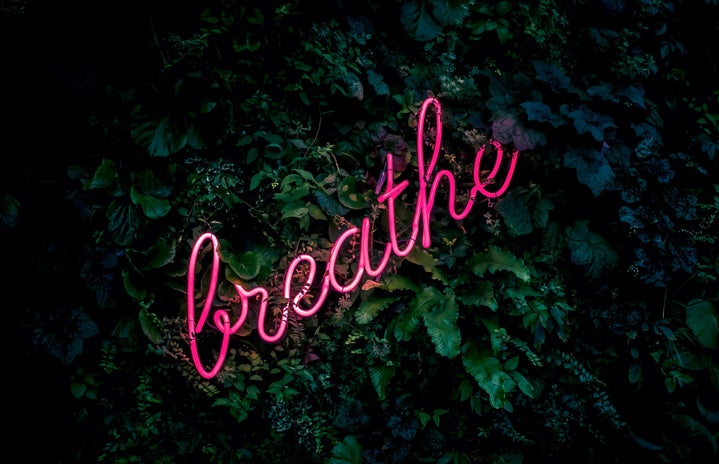“So, what are you planning on doing after university?” This question has grown to haunt me at family get-togethers and various student events. As a possible graduate of 2022, it recently dawned on me that I only have a semester to figure out what I’m doing post-graduation. This quarter life crisis is reminiscent of Grade 12, and I feel like I have to make a huge decision that will impact the rest of my life. Only this time, I don’t have a team of friendly guidance counsellors to hold my hand and must navigate the maze that is grad school and job applications alone.
The main problem I’ve faced throughout this process is the pressure to have the perfect plan. There’s a societal demand to work– and if you don’t have a stable career immediately following university, you’re viewed as a failure. Like many students I know, this “full-speed-ahead” approach has been my reality for many years. I went straight from elementary school to high school, and straight from high school to university. So, as you can imagine, I feel that I must also go straight from university into my career.
When browsing grad school websites or scrolling through Indeed, I find myself daydreaming about travelling for a year in France or taking a fifth year in my undergrad. I find that despite these temptations and my friends’ encouragement, however, something in my brain won’t accept these as viable options. I view them as less successful, but why? Why shouldn’t you be able to take time to figure out the rest of your life?
A main reason for my ultra-ambitious outlook is the favouring of linear career paths in mass media. The ideal of constantly working towards your career is a common trope in many coming-of-age sitcoms. I remember watching an episode of The Carrie Diaries where protagonist Carrie Bradshaw decides to work at a magazine for a year before going to college. This sparks a furious response from her father, who threatens to cut her off if she doesn’t go to college immediately after high school. Even though Carrie is gaining valuable work experience during her year off, her choice to divert from the traditional path is viewed as utterly unacceptable. I feel that the need to constantly move forward causes students to avoid gap years, even if the time off could benefit their situation. That period of free time could be used to recover from academic burnout, save money, or figure out what major/ job you wish to do.
“I believe it to be important if a person isn’t sure about the future or requires time off after exhausting education, to take time to think about it,” says fourth year Western University student Fernanda Alarcon.
After the passing of her mother, Alarcon was left feeling at a loss for her future and chose to take an extra semester in high school. With some encouragement from her sister, Alarcon worked hard and received the Honour Roll and Art awards during this time. “Taking an extra semester not only helped me academically, for my future, but emotionally as well. I had assumed that a person like me could never reach goals such as getting into a university, but my sister and family reminded me of me!”
When looking to the future, Alarcon feels that being a student pursuing a creative major adds to the pressure to succeed. “My plans for the future are to get admission at Vancouver Film School, it being one of the top film schools in Canada, but it is also an expensive education.”
As a fellow arts and humanities student, I share Alarcon’s financial fears and have always envied the more straightforward career path that comes with a math or science related degree. These particular majors still entail their own struggles, but the idea of having a stable career postgrad sounds incredibly blissful to a student who has constantly been fed the “starving artist” narrative. I feel that this stigma adds to the pressure to succeed because you feel that you must prove yourself to others.
Another aspect of being an artist is the beginning period of your career where you must figure out your creative identity. Unfortunately, this journey to self-discovery doesn’t mesh well with the ‘traditional’ path to success.
Alarcon references her sister’s non-linear career path and states that “My sister for instance, dreams about being a director of photography and working in Walt Disney Animation Studios. But she is currently taking time off school, […] and working a part time job which has helped her realize other ways of working towards her dreams.” Alarcon’s sister now runs a photography business while she prepares for her future in animation.
Close friends of mine share Alarcon’s outlook and keep reminding me that your twenties are supposed to be the time when you figure yourself out. And yet, eighteen straight years of school doesn’t give you a whole lot of room to go soul searching.
Taking time to work on yourself and figure out your ambitions is a process that was undertaken by second year Fanshawe College student Rachel Moore. “Being in the school system from ages 3-18 helped me in many ways, but taking a 2-year break forced me to be independent and alone for the first time.”
Moore also noted that these two years gave her the time to save money while allowing her to work on herself. “I was doing things for me, and mostly stayed at home alone getting to know myself. I was forced to find out who I was and what I wanted to do. It was the most refreshing pause of my life.”
This idea of taking time off is a common practice in Europe, and many students take a gap year following either high school or post-secondary education. According to a 2020 Teaching Abroad article, the UK Government estimates that between 200,000 and 250,000 students take a gap year each year. There are also many gap year programs in the UK for students to experience valuable workplace or internship opportunities during their time off.
I feel that we could take notes from the UK and start making non-traditional career paths more normalized in our society. Moore shares this opinion. “Our brains aren’t even fully developed until age 25,” she stated. “How are we supposed to decide exactly who we are and what we’re going to be when we’re still growing up? Your 20s are for discovering yourself – a perfect time to decide what passions you want to pursue!”
This perspective that Moore shares could save a lot of students from the headache and stress that comes along with navigating their careers in their twenties. Careers are constantly fluctuating things and should be accepted as such. According to a 2020 Go Remotely article, the average person changes careers 5-7 times. So, although society expects you to make a decision in your twenties and stick with it, it is absolutely okay to make changes along the way.
While I do believe that you must consistently work towards figuring things out, the idea that you must follow a straightforward path can be extremely damaging to many young adults. I don’t know who needs to hear this, but it’s okay if you don’t have a clear-cut plan for your career, and there is nothing wrong with taking time to figure it out.
Despite common belief, going to the “right” high school, followed by the “right” university, and then to the “right” job isn’t the only path to success. Whether you’re in high school, university, or just starting to find your dream job, just remember that your career doesn’t need to be a perfectly plotted line on a graph.
If you need to, take a step back to find out what career you truly want – because let’s be real my fellow scholars, if you’re like me and have been doing this for almost two decades, you too deserve a break.


